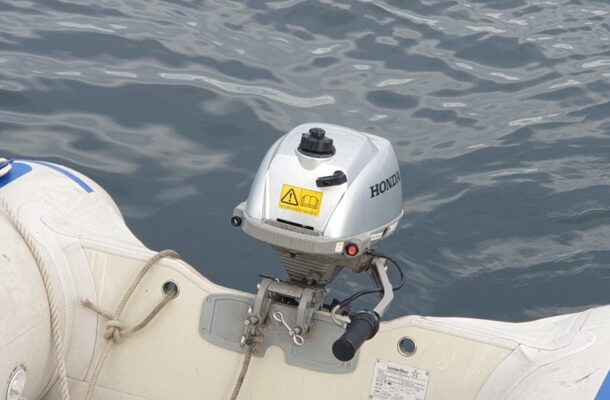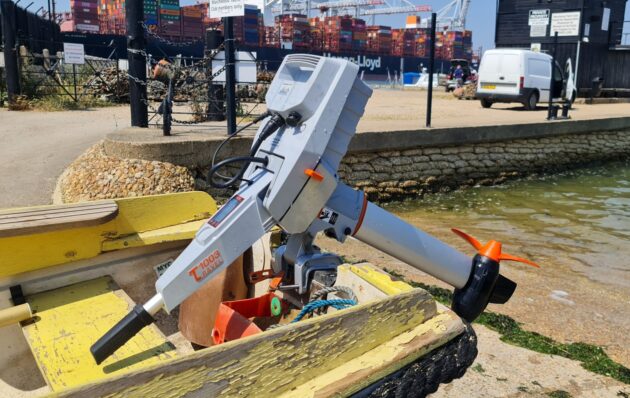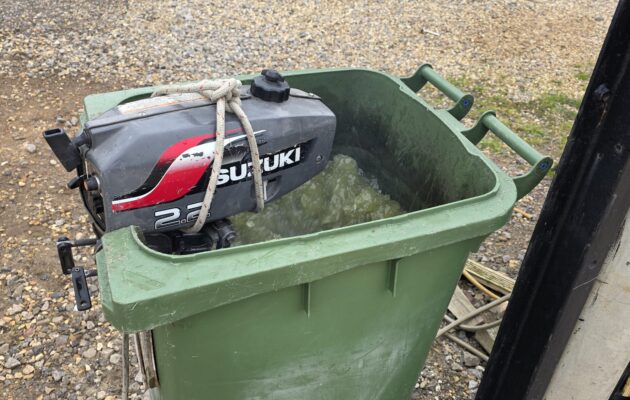Petrol outboard engines VS Electric outboard motors: real world comparison
I commute every day by inflatable tender. I switched over to an electric outboard motor and it was the best decision I could have made. Here's my real world take on the debate of petrol engines vs electric motors...


Never mind the shell suits of the early 90s, we're talking about the petrol outboards, they were our only option at the time.
Anyway, here we are, 40 plus years later. We have mobile phones more powerful than any home computer from the 1980s and 90s, we have comfortable electric cars capable of faster acceleration than any petrol super car, I can control my autopilot from my James Bond esque Garmin watch ( A Quatix 7, look it up, it's absolutely brilliant)[1] and technology that has made lives unbelievably brilliant and so much easier than 40+ years ago. We have wind farms, solar farms, home solar power, house powerbanks and brilliantly portable lithium powerbanks[2] instead of noisy gen sets.
Yet, some folks cling to their noisy, smelly Petrol outboards in the fear that anything else is inferior. 
What are the arguments in favour Petrol outboard engines?
- It is tried and tested technology, you know where you are with petrol and since they banned the sale of new 2-stroke outboards, we now have 4-stroke petrol engines to deal with and some ageing older 2-strokes still in circulation on the second hand market.
- They are cheap to buy on the secondhand market
- The spares are readily available. You can find the spares for most common outboard engines available in chandleries and dedicated dealers. (online and in shops)
- You can carry a spare can of fuel to help boost your range.
- Refuelling takes minutes.

What are the arguments in favour of Electric outboard motors?
- They are established on the market for nearly 20 years so the technology has been tried and tested.
- Spares (not that there's many actually needed) are readily available via chandleries and dedicated dealers (online and in shops)
- Some electric outboards allow for solar charging while they are in motion.
- They can be topped up from any electrical outlet, 12v DC to 240 AC and Solar.
- You can carry an extra battery (for some models) if you need more range
- They show their power remaining and some have estimated time remaining clearly visible on a display
- They have forward and reverse by touch button
- Very quiet running, you can have a conversation easily sitting right by it, even at max power.
- There's no maintenance required.
- No servicing costs.
- No fuel or oils involved so no mess
- A rinse with fresh water is the only maintenance required.
- Can be easily stowed in any locker, cupboard or bunk in any position.
- Most can be submersed briefly, are not adversely affected by a dunking.
for a group test of electric outboards, we got a bunch of the best electric outboards[3] together to see how they compare. a few more have become available though since this test.

What are the arguments against Petrol outboard engines?
- Messy, oil residue on the leg can end up on your clothes or other furnishing. Carrying in the car needs care.
- Very particular stowage position, must be stored in a way to avoid oil/fuel flooding the chamber
- Annual servicing costs and time
- Need to go to a fuel station to get petrol
- You can't tell how much fuel you have left unless you unscrew the fuel tank to look inside.
- There's no external range indicator.
- If the engine is even briefly submerged, it will need to be stripped down and cleaned out to avoid engine seizure.
- Noisy, some can be very noisy
- Smelly. especially 2-stroke older engines
- you need to run them dry for safe stowage and to avoid a blocked carburettor

What are the arguments against Electric outboard motors?
- Expensive outlay at the start
- Can't be charged from empty to full as quickly as a petrol engine
- They are limited in power/model options.
What are electric outboards like to live with and will I save money in the long run?
At no point did I consider what I might save on petrol as a consequence of switching to an electric outboard. That was't part of decision making process for me.
But if were to work it out, I'd say I would use between GBP7 (5 litres/1 gallon)and GBP14 (10 litres/2 gallons) each week on petrol, which over the course of a season of 7 or 8 months would cost Approximately GBP380. If we add on the servicing costs and my time taken to service, we're looking at roughly GBP500 per year to run a petrol outboard on my tender, used as a frequent commuter to and from a pontoon to my boat on a mooring. My outboard motor cost me, as a slightly used model, roughly GBP2000. Once I switched to electric, the first thing I did was work out just how many times I could go to and from my boat for how much battery depletion.
Surprisingly I was able to go all week without needing to charge. But rather than let the outboard run completely empty, it was much easier to just top up, occasionally from my onboard boat battery bank over night, then let that charge back up by solar power in the day. Or bring it to my office in the day and plug it in for a charge.
Lifting the outboard off and carrying it to my car is made easy due to the way the bulky bracket of my chosen electric outboard, the award winning Remigo[4], stays on the tender, allowing the outboard to be a little less heavy, and much easier to transport than if the bracket remained attached.
With the array of outboards available these days, there's something suitable for almost everyone.
Page 2 of 2 - Show Full List[7]IntroductionPage 2[8][9]References
- ^ Garmin watch ( A Quatix 7, look it up, it's absolutely brilliant) (www.yachtingworld.com)
- ^ brilliantly portable lithium powerbanks (www.mby.com)
- ^ best electric outboards (www.yachtingmonthly.com)
- ^ the award winning Remigo (www.yachtingmonthly.com)
- ^ 1. Introduction (www.yachtingworld.com)
- ^ 2.
Page 2
(www.yachtingworld.com) - ^ Page 2 of 2 - Show Full List (www.yachtingworld.com)
- ^ Introduction (www.yachtingworld.com)
- ^ Page 2 (www.yachtingworld.com)